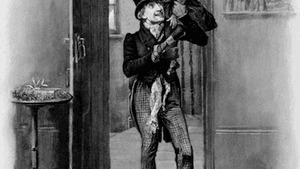Stay in the Loop
BSR publishes on a weekly schedule, with an email newsletter every Wednesday and Thursday morning. There’s no paywall, and subscribing is always free.
God help us, every one
When fake news invades real life

Fake news is a real problem. I used to think that statement applied only to the other people who get fooled, since I tend to confirm stories that seem outlandish or odd by consulting several reputable sources. However, this didn't stop me from making assumptions about a local story that got national attention, based only on a Facebook comment and the resulting thread. I consider myself humbled.
The offending “news” item was about a young Jewish boy who is a fifth grade student in the Hempfield school district, at the same Lancaster County school my son once attended. According to Lancaster Online, the boy's parents (who are keeping their identity as secret as possible) asked in September that he be excused from participating in the class production of Charles Dickens's A Christmas Carol. Later, the play was canceled because its in-class rehearsals took up too much time. Some parents blamed the Jewish student and his family rather than a reassessment of existing practices by staff (for Hempfield's official response to questions about the incident, click here ). The parents of the scapegoated child, fearing for his safety, pulled him out of school a day before a previously scheduled December vacation. They hope to return their son to the school this week, but plan to see if the climate has changed enough for him to be spared further harassment.
Your story, my story, and the truth
Here's what I remember of the December 23, 2016 post I saw on a usually well-informed friend's Facebook page: “Hempfield canceled A Christmas Carol. Stupidest. Decision. Ever.” Having never heard the story, I scrolled down and saw references to an objection to the last line in the play, Tiny Tim's “God bless us, every one.” An atheist commented that her boyfriend, another school's music director, also an atheist, was getting grief from a set of parents because so much of the music in a December concert referred to Christianity, or occasionally, Chanukah. His criteria for most of his selections was the wealth of pretty music about Christmas. I read a bit further and saw that atheists weren't involved in the local story — the family was Jewish, and they fled the district. Then I read they hadn't fled; they'd just taken a vacation.
I was reassured to read that the family hadn't been driven out of Lancaster, but was disgusted that a young boy was being bullied, a torment I know from personal experience. My other reaction was that the atheist director had it right: sometimes, music can be mainly about music; a play can be mainly about a play. Besides, A Christmas Carol is more about income disparity and caring for other people than anything else. Scrooge is redeemable, his miserly ways are explainable, and the end is a warm and fuzzy moment. Do we really have to shield children from a humanist message to avoid any mention of God? To quote the atheist commenter, is atheism now the state religion?
As you can see, I was barking up the wrong (Christmas) tree, even without prodding by Breitbart or Fox News, who took the local incident and used it to provide evidence of the War on Christmas. There was a time when I would have corrected the misinformation on the Facebook thread myself, or at least commented on something truly relevant, but over the past year, and especially since election day, I can only stand the news in small doses. I've spoken to several people who feel the same way: We must choose between remaining ignorant of potentially important information or developing an ulcer, so a lot of things escape our radar.
"Believe me"
Even if I continued to absorb newspapers, CNN, and NPR at my previous rate, I would still suffer from an insidious side effect of both the number of false stories in circulation and President-Elect Trump's constant attempts to discredit news outlets, wondering, more than I used to, if the things reported by sources previously considered reputable are completely true. Of course, there is always more information available on any topic, but to return to A Christmas Carol, when I read that the play was canceled because it took too much time away from instruction, my first impulse was to question the accuracy of that statement. To be clear, even if one child's family objected to the choice of the Dickens play, the final decision to cancel would lie with the powers that be. Harassing someone for expressing an opinion is a violation of the First Amendment; in this case, no objection to the play was raised anyway. Still, having not researched the story, I wondered why a district known for putting on artistic events would suddenly be unable to manage this production, an annual tradition. The important missing piece of the puzzle turned out to be a first-year principal, Tom Kramer, whose presence explained the re-examination of previous norms. The thing is, if I'd relied solely on Facebook for information, I probably wouldn't have known about him.
Unfortunately, an estimated 44 percent of U.S. adults (or more, according to other sources) rely on Facebook for news. I'm getting used to seeing people with no frame of reference spouting non-facts as gospel, but I was still dismayed to see a group of Trump voters — all active in their local governments — in a CNN post-election interview touting a fake story about President Obama encouraging undocumented people to vote. The woman who raised the “issue” said she saw the item on Facebook, insisting, despite the CNN reporter's protests, that it was also reported on CNN. Of course, Pizzagate was a far worse example of accepting false information as truth.
I'm glad to see Facebook taking steps to flag stories that come from unreliable sources. However, I suspect many will continue to believe what they want to believe. I don't usually make new year resolutions, but this year I resolve to resist falling down this particular rabbit hole again.
Sign up for our newsletter
All of the week's new articles, all in one place. Sign up for the free weekly BSR newsletters, and don't miss a conversation.

 Maria Thompson Corley
Maria Thompson Corley